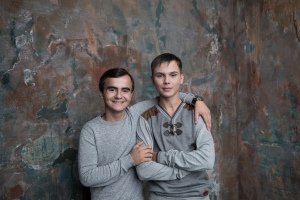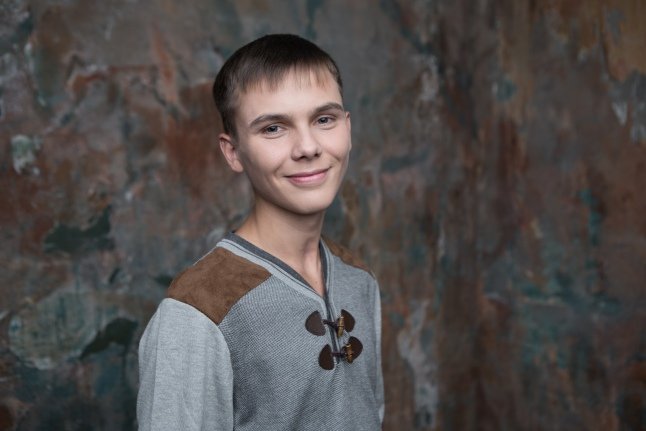Sergey Svyatkin: Illness Didn’t Have a Chance
Everyone who’s worked at the Podari Zhizn Foundation for a while remembers our star for April, Seryozha Svyatkin — not someone you could easily forget. Seryozha spent four years being treated at the Dmitry Rogachev Centre for Pediatric Hematology in Moscow, and another two in Saint Petersburg before that. Today, Seryozha is no longer running that marathon. Instead, he’s become an extreme sprinter.
What are you doing these days?
I’m studying to be a logistician at college. In my spare time—which I have plenty of—I do extreme sports. In winter, it's snowboarding; in summer, wakeboarding and motorcycling. In short, I love risk and adrenaline.
Is that an effort to live life to the fullest now that you’ve regained your health?
No, not really. I’ve been drawn to extremes ever since I was a child. I was a very boisterous, cheerful kid. I couldn’t sit still—I always had to be doing something. My illness didn’t dampen my desire to try new and dangerous things. In fact, it actually amplified it. These days, I know life can throw surprises at you—not always pleasant ones. So while everything’s going well, I seize the day and chase my dreams, even if they come with risks.
How did you find out you were ill?
One time, my platelet levels dropped dangerously low, and we went to the hospital for blood tests. After the results came back, the doctors told my mum what was happening. She hid it from me as long as she could. Later, when we went to St. Petersburg, I realized something was seriously wrong. That’s when my mum told me I had a dangerous enemy—aplastic anemia. I understood then that the near future wouldn’t be easy.
How did you end up in Moscow?
At first, we were supposed to go to Samara, but then they decided to send us to Moscow. I really didn’t want to be hospitalized, especially so far from home. But I didn’t complain or throw tantrums. I understood my main goal was to recover, and that it was in my best interest to go through with it all. My future depended on it.
What was life in the hospital like?
Every morning I woke up thinking, “Maybe today my doctor will let me go home.” But for many days, nothing changed. I just kept going through treatment. My doctor was a huge help—she explained everything about the illness and treatment clearly, and I’m very grateful to her. She’d come into my ward, sit on the bed, and walk me through the next steps and the challenges ahead.
There were times I didn’t talk to anyone—not just for a day or two, but for a whole week. Chulpan Khamatova and Gosha Kutsenko really helped me during those times. They came to visit and tried to lift our spirits. But it wasn’t until I physically started feeling better that the mental fog began to lift. I stopped spiraling into dark thoughts and fears about death.
You were known as someone cheerful and energetic, even in the hospital. What did you do?
I had a lot of fun in the ward, especially when the doctors weren’t around. We played cards and board games, raced each other while attached to IV drips, and just ran around laughing. I had some very good friends there, but sadly, many of them are no longer with us. That’s the hardest thing to remember—not the hospital, but the people I lost.
How did you cope with their passing?
The doctors usually did their best to hide that kind of news. No one told me when a friend had passed away. I’d usually find out online. I wasn’t angry—I knew they were trying to protect me.
You spent four years in the hospital. How did you keep believing you’d recover?
I didn’t have to convince myself—I just knew I would recover, no matter what. I believed it, my mum believed it, and so did my doctor. You could say that thanks to that shared belief, the illness didn’t stand a chance.
Did volunteers visit your ward?
Yes, we constantly had volunteers. I associate them with fun, laughter, and positive emotions. We’d watch videos, talk about life, share news. I’m deeply grateful to them, and to the Foundation, for everything. Together, they helped people like me return to a normal life.
What does “charity” mean to you?
To me, charity is the desire to help—turned into action. I say that because I’ve lived it. One school in Moscow ran charity concerts for me for two years. That money helped us a lot. Teachers and students came to visit me in the hospital, too. At the time, it was hard to believe such kindness existed. I hadn’t even met most of them before I got sick. Their support gave me faith that I could make it through.
What was rehabilitation like when you were finally allowed to go home?
Honestly, by then I didn’t really want to leave. Four years is a long time. I had lost touch with the outside world. I didn’t know what was going on anymore, and I was scared to return. But I needn’t have been. I came home, went for walks, and reconnected with old friends. They welcomed me warmly.
Why did you think they wouldn’t? Had you changed that much?
I don’t think I changed—more like toughened up. I began seeing life differently and valuing things I never noticed before. These days, when I think about doing a risky snowboard trick, sometimes fear stops me.
What would you wish for children currently undergoing treatment?
I’d wish them belief—that everything will work out—and that they never lose hope.
Zhenya Vaneeva recorded 12 inspiring stories from young cancer survivors. Each month, we’ll share one of these powerful personal stories.



